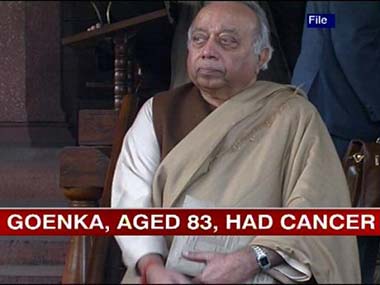A small notice in today’s newspaper announced that the Calcutta Electric Supply Corporation’s offices would remain closed on Tuesday April 16. All bills due on April 16th “may be paid on April 17, 2013 with full rebate”.
Until they read that notice, many Kolkatans probably did not realise that the chairman of CESC, the utilities company they had grown up with, was Rama Prasad Goenka, the “takeover tycoon” who died in Kolkata on Sunday.
At the time when he took over CESC, the state was under the rule of Jyoti Basu, the Communist patriarch. He was not happy with Goenka’s penchant for takeovers and had also tried to get Indira Gandhi to stall his acquisition of Dunlop tyres. But eventually Jyoti-babu gave in to Rama-babu because he was as The Times of India headlined it “the tycoon who kept faith in Bengal.”
[caption id=“attachment_698253” align=“alignleft” width=“380”] Rama Prasad Goenka died on Sunday April 14, the last day of the Bengali year 1419[/caption]
At a time when Kolkata was the “dying city” and industrialists were abandoning it, Rama Prasad Goenka, the Marwari businessman, stayed put. Newspapers in Kolkata today are saluting the loyalty of RPG. Mamata Banerjee who called him a “true champion of industry” surely wishes there were more RPGs around Kolkata these days.
The Times of India writes that when he asked his grandfather, Sir Badridas if he should leave, the old man told him he could do what he liked but he (Sir Badridas) would never leave. Rama-babu never did either.
Impact Shorts
More ShortsAs his obituary in The Telegraph rather romantically describes it:“The decision to stay on may have blunted business opportunities and ambition but he wasn’t prepared to trade in 200 years of his family’s deep-rooted connections with the city for the lure of lucre.”
It makes money sound almost dirty in a fussy Bengali way. While the stories of Rama-babu in his dhuti and panjabi and his fondness for begunis (fried eggplant slices), kachuri from Putiram and Bengali novels paint a nostalgic portrait of a babu more Bengali than most Bengalis around him, it is hard not to miss the irony. The quintessential Bengal babu, an alumnus of Presidency College where he studied history, was actually a shrewd Marwari businessman. While his Bengali friends were having adda and cha and pondering the fate of the world, the indefatigable RPG who loved eating abar khabo (eat again) sandesh was also gobbling up industries that included tyres, tea, electricity, pharmaceuticals, petrochemicals and more.
Some of those were household names in Kolkata, hallowed companies from British days. Dunlop. Ceat. Asian Cables. Carbon Black. Agarpara Jute. Murphy India. Searle Inda. The Gramaphone Company of India (Saregama India). CESC. Not everyone realised they were now actually owned by RPG. Few knew that he almost sealed a secret deal with Neville Wadia to take over Bombay Dyeing until Neville’s son Nusli got wind of it and “went ballistic”. Nusli found an ally in J.R.D. Tata and had a confrontation with his father and Ramababu backed off - “a decision that rankled for the rest of his life.”
Rama-babu’s ‘Bengali’-ness stood him in good stead with the Communist babus who ruled Kolkata. Somnath Chatterjee, the Communist leader who became the Speaker was his great friend.
“I salute him for his commitment to Bengal,” said Chatterjee. RPG made friends across the political spectrum. He once told the BBC that if he had two votes, he would cast the first for the Congress and the second for the CPM - a perfect formula for a businessman in Bengal in those days. Those relationships continued in the new Bengal. Trinamool MP Derek O’Brien who went to school with his son Sanjeev was one of the first to come pay his respects. But Indira Gandhi was always his number one choice. RPG was so close to Mrs Gandhi that he earned the nickname “Poster Goenka” because he printed her campaign material. His proximity to her earned him a few days in jail during the Janata years. But his friend Mani Shankar Mukherjee told The Telegraph he bore no grudges even to those who were hired to spy on him.
“How long will you stand outside and suffer?” he would tell them. “Do come in for a cup of tea.”
During his final illness, he asked Mukherji for a Bengali vegetarian meal. Mukherji writes that because his own kitchen was “in a state of wilderness” after the demise of his wife, he hurriedly got Bapi Barik of the catering company Bijoli Grill to rustle up a meal at a few hours notice. Rama-babu was happy.
Rama Prasad Goenka died on Sunday April 14, the last day of the Bengali year 1419. As Kolkatans woke up to Poila Boisakh, the first day of 1420, the front pages of their newspapers were covered with stories of Rama-babu’s passing. The Marwari who had once said “If I am not a Bengali, then who is” would have probably chuckled about that.


)

)
)
)
)
)
)
)
)



